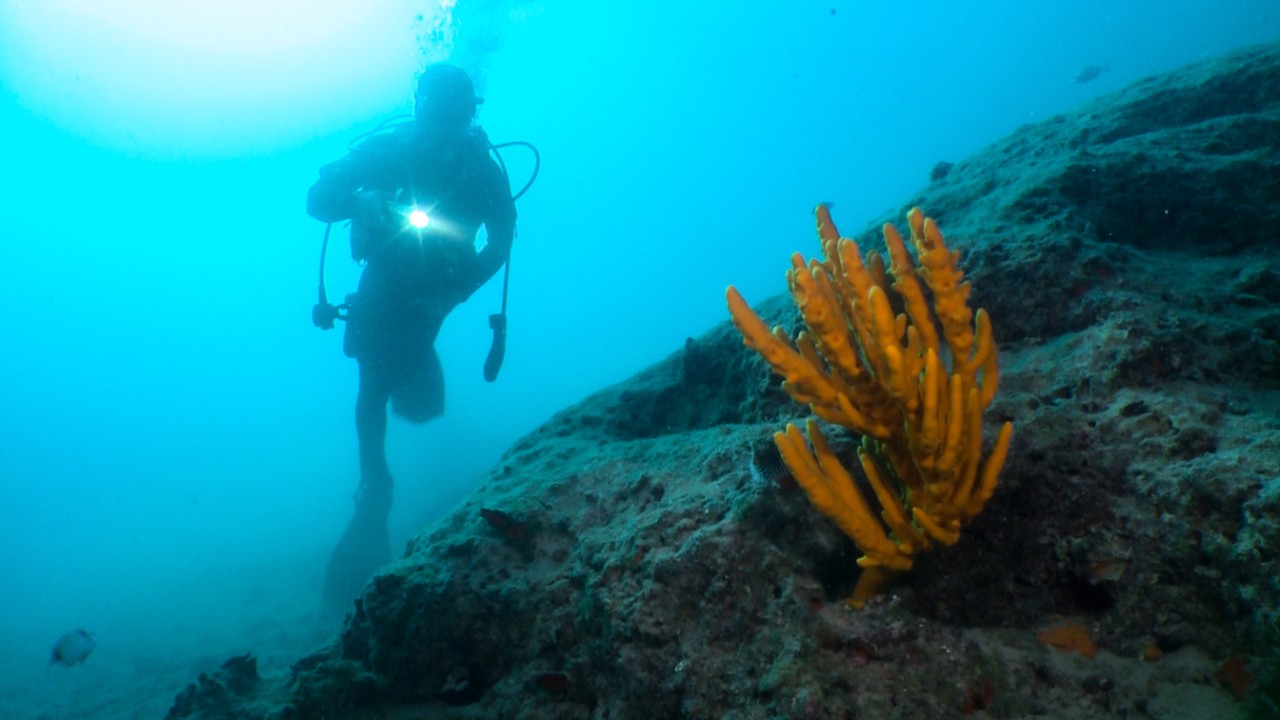Underwater at Albania's Karaburun Sazan Peninsula. Photo: Claudio Amico / UNDP Albania
Tirana, 28 July 1998: Temperature 32 degrees
Tirana 28 July 2019: 39 degrees
In Albania this summer, extreme heat waves were almost unbearable for people. There are less fish in the sea, and with the erosion of the shoreline, citizens of a local beach recently claimed that their land “has been eaten by the sea”.
Albania will be one of the most affected countries in Europe by climate change.
It is not a big contributor to global warming: hydropower-generated electricity and the lack of heavy industry means the country is a low-carbon economy. But the country is committed to further reduce the carbon dioxide emissions by 11.5 percent, in its contribution to the Paris Agreement.
For many years, UNDP has been assisting Albania to assess its contribution to climate change, plan accordingly to mitigate the impact from different economic sectors, and design measures to adapt to current and expected climate changes. Public awareness is a key component to that.
So we have actively been seeking new partnerships for development causes. Achieving the Sustainable Development Goals (SDGs) will require public and private sectors to work together, and work at a bigger scale. In this context, we are working with Tirana Bank to promote the protection of the environment and help Albania achieve some of its environment-related goals.
Together, we co-designed the “All around the Earth” campaign, tackling two key environmental protection issues: climate change and recycling. The campaign put citizens' role in the environment protection upfront, alerting the public about the gravity and urgency climate change threats. It called on them to act urgently to safeguard nature, and gave people concrete daily actions they could take.
One ad (above) provided climate change data such as rising temperatures and the effects on environment and people. It propsed actions such as switching to energy-efficient lightbulbs and energy star products, thermally insulating their homes and investing in solar panels and thermostats.
The other (below) showed data on how recycling can help protect the environment. Recycling paper conserves natural resources, saves energy, and reduces greenhouse gas emissions and pollution. The ad encouraged people to recycle at school, home and workplaces, bring their lunch in reusable containers and reduce paper consumption.
Both the bank and UNDP shared the campaign across their social media platforms. The bank also purchased airtime on the most popular online news portals, which posted our social media banners and ads, maximizing public outreach. Our partnership enabled us to reach more citizens with this urgent call.
Having learned about the SDGs and understood the key role that the private sector can play, Tirana Bank joined us to amplify the message.
The bank also realized that sustainable solutions and operations would be good for the bank itself, would reduce costs, and would help tackle the climate crisis.
A partnership for public awareness? Not only
But this partnership is unique in that it’s not just to raise public awareness. While they already had an extensive Corporate Social Responsibility (CSR) Programme addressing social and environmental concerns, now Tirana Bank is undertaking several actions to change their daily business operations.
They are investing in making their 35 central and all local offices across the country energy efficient by installing solar panels for hot water (benefiting from Albania’s 275 sunny days/year), switch to energy-saving light bulbs, improving the recycling process and recycling more paper.
Although it seems impossible for a bank to go paperless, they are taking concrete steps to reduce how much paper is used or wasted. Employees are encouraged to edit and finalize all documents digitally, print only on recycled paper and on both sides when feasible, send international communication through email or via their internal intranet, and switch to online billing.
The Bank is also embarking on programs to support the private sector and citizens invest in energy efficiency and renewable energy technologies to mitigate climate change. It has conveyed a sense of urgency to their 500 employees and engages them in volunteer programs to clean our beaches and coastal areas. They understand that this is good for business, the environment and the people.
When you enter Tirana Bank offices, you see posters reminding their employees and 6,500 daily customers to protect the environment. And our two ads are continuously aired on their bank monitors.
Private companies do want to be associated with the SDGs once they know and understand it. We have to bring companies together to talk about them through forums, conferences and one-on-one meetings. But we also have to encourage them to make changes to be more sustainable within their own walls.
Despite the existence of mounting literature underlying the economic argument for achieving the SDGs, many companies are struggling to articulate the business case within their operations. Presenting SDG principles and values as future business opportunities that will enable companies to grow and contribute to development priorities is key.
As Albania and the world feel the devastating impacts of climate change, one should stop and think: How can we remedy this before it’s too late? Partnerships are vital, especially in moving corporations from combatting climate change as a CSR initiative to integrating sustainability into their own operations.

 Locations
Locations





